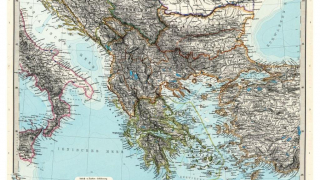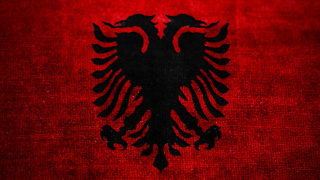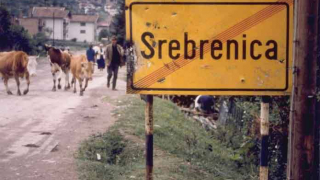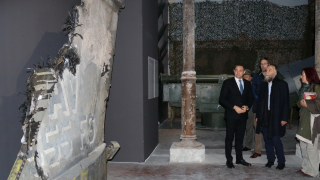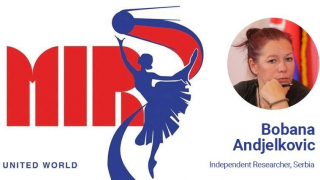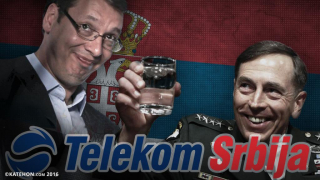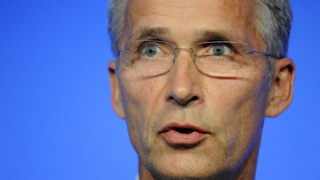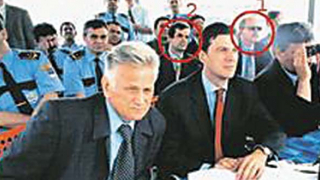Geopolitics of Balkans: drowning in the Atlantic
Dr Stevan Gajić
Institute of European Studies
Belgrade
Address at the conference
From Atlantic to Pacific: For a common destiny of the peoples of Eurasia
Kishinev, 27 May 2017
As we all know, it is in the nature of human beings to believe that problems they are facing are the most important in the world. As someone coming from Serbia and representing the Serbian people, I do find Serbian problems to be immense, and would therefore like to talk about them today. I would like to inform you about the latest developments, for I see these meetings not important only for sharing our philosophical insights and thoughts, but also for meeting and informing each other about what is going on in different regions of the world.
I believe that we the Serbs as a people were subjugated, and still are, to the policy of hard core military and today ‘soft’ liberal interventionism. This is happening visibly since the end of bipolar global system and since the collapse of the Soviet Union. Yugoslavia was, as you know, a buffer state between two global rival blocks. It was neither part of the Warsaw Pact nor of NATO, but it did lean towards the West ever since 1948. Since Tito’s break with Stalin, or perhaps his betrayal, depending from which ideological position one looks at it.
Today I wish to tell you about what is going on now, after the awakening from the drunkenness from happiness after Trump’s victory. I want to publicly say that our friend, present here, Mr Levan Vasadze, was correct when he said several months ago that Trump is actually going to be a big disappointment and that regardless of Trump’s personality, things are going to continue. He pointed out that even if Trump does have good intentions, he will be broken. What goes on currently in the Balkans is exactly the breaking of ‘Trumpism’. Especially of his inaugural speech, in which he declared the end of the era of liberal interventionism. Well, it is not over, and the ‘deep state’ is showing its face even more in the Balkans now than in recent years, especially since 2000 when we experienced a softer version of liberal interventionism. This is primarily visible in two faces that represent the American deep state in our region. One is the well-known senator John McCain, who is in my opinion always an alarming figure; when he shows up somewhere, it usually means that region is now in the focus and that it might expect turbulence, to say the least. He recently made a Balkan tour and afterwards wrote an article in the Washington Post where he expressed deepest concern of the possibility of war, because “nationalism is rising in the region”. After McCain came a technician. It is a diplomat Hoyt Brian Yee, Deputy Assistant Secretary for European and Eurasian Affairs at the State Department. With his appearance we actually see the materialisation of what McCain was talking about.
Yee first visited Skopje with a clear policy. There a nationalist government, or a ‘pro-Macedonian’ government (who are far from being saints), initially also an Atlanticist one was to be removed. Yet their ‘turn’ was ‘over’ and somebody has decided that they should leave, while the new ‘boys’ should come to power. He persuaded the Gruevski government to give up power to the opposition which joined forces with the Albanian minority parties. Ethnic Albanians are officially pushing the agenda of federalisation, but in fact they want the dissolution of the Macedonian state, and annexation of “their part” to neighbouring Albania. Of course, I was not present at these talks to know for certain, but the word is that Yee threatened that if the demands are not met Macedonia would sink into civil war. This would be a very complicated civil war because it would not only be an ethnic one, but also a political among Macedonians themselves, along the main two party lines and of course Albanians vs Macedonians.
Yee’s next stop was Belgrade, where he expressed his concern about the ‘malign’ influence of Russia in the Balkans, but at the same time in Washington he said a very important thing—especially for the Russians to hear—that “Russia is behaving opportunistic”. In other words, wherever Russia can spoil something in the Balkans, especially concerning the ‘glorious path towards the Euro-Atlantic integrations’, they (Russians) will be spoiling. But there is no true strategy and these are only reactive moves. They are annoying for the US, but are not part of any coherent strategy. I think this is alarming, because there is no vacuum of global power or influence in any geographical spot of the world and Serbia is very important – Serbia and other Serbian lands which are in different degrees of occupation. I am speaking of Kossovo, Bosnia and Herzegovina, Montenegro that will formally join NATO at the upcoming summit… And with the enlargement of NATO to Montenegro, an old Anglo-Saxon dream of pushing the Serbs as a factor (not as bare individuals, but as a political factor) away from the Mediterranean.
After the end of the 1990s (wars of Yugoslav succession) we are facing a form of post-modern neo-feudalism. When one looks at the map of the Balkans it really looks ridiculous. The borders mimic snakes and they do not make any sense. They do not make sense because they are not ‘natural’ in any way. What is even more alarming is that the geopolitical schemes are surviving. History does not repeat itself, but the geopolitical patterns remain, regardless of policies. If one looks at today’s map of Serbian space, it looks very much like the map of the occupied Kingdom of Yugoslavia during World War Two. During that war there was a large Italian/German occupation zone where a killing factory for Serbs was formed, the puppet Independent State of Croatia, with its infamous and officially promulgated genocidal programme – that one third of Serbs should be murdered, another third expelled and the remaining third assimilated through forceful conversion to Roman Catholicism. Most of central Serbia was under direct German occupation; the north (Voivodina) was divided between Germans, Hungarians and Croats; the south (Kossovo and Metochia), as well as western Macedonia, was part of Mussolini’s puppet Greater Albania; while today’s southeast Serbia and east Macedonia was occupied by Bulgarian. I am saying this because today’s map resembles such geopolitical pattern. Serbs are surrounded by countries that are either members of NATO or under the direct occupation or some form of soft occupation. Bosnia-Herzegovina is not an independent state. As a state it only exists on paper, but is actually divided in to two parts, officially still ruled by the so-called OHR (Office of High Representative), currently an Austrian national, which is another historical parallel because the Austro-Hungarian Empire occupied Bosnia after the Berlin congress in 1878 and later annexed it in 1908, which was one of the main reasons for World War One. It almost broke in 1908 because the tensions between Austro-Hungarian and the Russian Empires were high due to the annexation crisis, as early as than.
Today’s tool of the deep state and of the liberal interventionism is unfortunately, as it was at the beginning of the 20th century, the Albanian factor. Bulgarian historian Teodora Toleva had a unique access to Austrian archives and after studying them she wrote a book Influence of the Austro-Hungarian Empire in creation of the Albanian nation. Her conclusion was that this nation was artificially glued from parts of a number of very different peoples and tribes. Result of this social engineering was that regardless of their religion or language, Albanians feel Albanian despite of not being a monolith, neither religiously nor linguistically. Austro-Hungarian Empire did quite the opposite with the Serbs. They divided the Serbs in our lands under their control along religious lines. Today we have the Roman Catholic Serbs, who would be very offended if they would hear me (Croats), and Bosniaks which are Serbs that converted to Islam during the Ottoman occupation. This is a great tragedy for our people. The Yugoslav wars were a brotherly bloodbath and it seems to me that—with this post-modern neo-feudalism artificially installed by the liberal interventionists—these divisions can be triggered at any time. This is how they actually manipulate and how they control this whole region.
Yesterday Montenegro joined NATO, but at the same time an Albanian flag was raised on the roof of a Church at mount Rumija near the coastal city of Bar in Montenegro. This is a grave provocation, as this mountain is revered by Serbian Orthodox Christians. So even with NATO, this symbolic gesture by the Albanian nationalists shows that Montenegro did not secure its borders. Especially in the light of fact that the so-called Kosovo parliament did not want to ratify the border agreement with Montenegro. On one side you have NATO in Montenegro, the meltdown of the Macedonian state, occupied Kossovo in the north, and even in ‘Chemeria’ in northwest Greece there are Albanian separatist tendencies, as well as in the south of central Serbia (next to Kossovo). I am explaining these nitty-gritty details because it is important to understand how many weak spots there are, which could be pressured to incite a conflict at any time if need be. In Serbia I am very critical of our government at all times, but when I take a step back, I start thinking what would I do in their position. Just like in WW2, we are left without allies. Serbs as people are very pro-Russian, that is not to hide because we are Orthodox Christians and we are Slavs and our history thought us that, but there was always a division between the people and the elites which exists now too and I think that we are nowadays dominated by a liberal paradigm. This is so to such an extent that it is not even recognised as a paradigm. I do not think that there is actually a coherent understanding within the society nor within the elites that they are actually a part of the liberal matrix.
Reasons for the continuation of the perpetual liberal intervention on the Serbian lands are also practical, they are not only philosophical and metaphysical. The practical component is that the Morava-Vardar valley—connecting Serbia, Macedonia and Greece—is the shortest way from Bagdad to Berlin, the shortest road from the Middle East to Central Europe. This is the reason for which even the refugee routes are going through it for it is the shortest geographical way. During the Roman times it was called Via Militaris – the military road. NATO is trying to cut off this road. To cut it off by creating a conflict if need be. Why do they have this necessity? One is the possibility of constructing Gazprom’s Turkish Stream or the South Stream gas pipeline along this road, while another is the ‘new silk road’ that China is planning. China bought the largest part of the Piraeus port in Greece. The Chinese are also planning to construct a high speed railway that would connect Greece and Central Europe (Poland) which should pass along the via militaris through Macedonia and Serbia towards Warsaw and possibly elsewhere in Europe. They established their central financial institution in Belgrade, which means that Serbia would be the financial hub for all the Chinese investments in Central Europe, possibly in Europe in general. The Russians (Gazprom) were trying to construct the South Stream, but it was blocked by the pro-NATO government of Boyko Borisov in Bulgaria and then we still do not know what would be the destiny of the Turkish Stream. The reasons for the continuation of perpetual liberal intervention and possibly inflaming the whole reasons are therefore practical.
I would like to conclude by saying that I am grateful to Mr Yuriy Rosca for inviting me to this important event. It is important to meet and discuss and exchange information. As I have said in the beginning, everyone thinks that their problem is the greatest in the world, that everyone has their own cross. Yet, I would urge you to pay more attention to this part of the globe, because the Balkans can be inflamed at any point in time.
Thank you very much!


